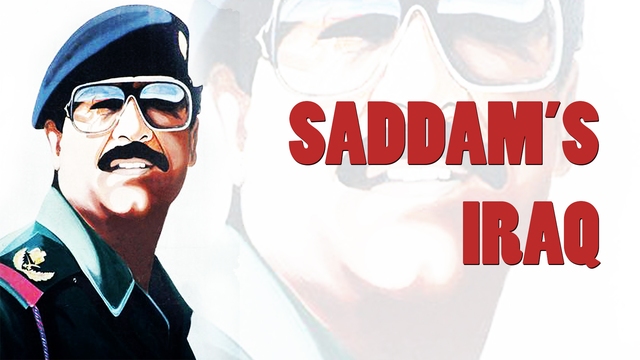Saddam's Iraq
What was life really like in Saddam's Iraq? Filmed just before the First Gulf War this is the story of a society dominated by one man.
 What was life really like in Saddam's Iraq? This week's offering is the definitive documentary on the cult of Saddam Hussein. Filmed just before the First Gulf War, it depicts a prosperous and sophisticated society in which every aspect of life is coloured by 'love' for the 'Great Leader'. Darkly ironic, this film captures the surreal and Orwellian nature of life under Saddam Hussein. In a country which today has lost even its most basic services, the testimony of this vanquished middle-class and the prosperity of their society resonates on many levels.
What was life really like in Saddam's Iraq? This week's offering is the definitive documentary on the cult of Saddam Hussein. Filmed just before the First Gulf War, it depicts a prosperous and sophisticated society in which every aspect of life is coloured by 'love' for the 'Great Leader'. Darkly ironic, this film captures the surreal and Orwellian nature of life under Saddam Hussein. In a country which today has lost even its most basic services, the testimony of this vanquished middle-class and the prosperity of their society resonates on many levels.
In 1989 American filmmaker Jeff B. Harmon went to Iraq to make a film about Saddam's unique brand of dictatorship. He found a cultured and surprisingly benevolent society, prospering despite the awesome power of its dictator Saddam Hussein. Visually a modern secular state, the contrast between this society and the anarchy and chaos of today's Iraq is shocking.
"In the West, they think we all ride camels", complains 17 year old student Saad Bashir. He spends his free time practising Rachmaninov and disco hopping but has vowed to die for Saddam Hussein. His compatriot, the novelist and art critic Jabra Ibrahim Jabra, agrees. "In the West, they think Iraq is a closed society. Nothing could be so far from the truth." Jabra praises the level of patronage artists receive from the state and lauds the lack of censorship. "I don't think anyone would oppose the state. Especially since the state allows artists free expression in their work. You never find the state telling us what to do."
Naji Salman Salih, Deputy Head of Iraq's Jewish community, believes that the real threat to stability in the region comes from Israel. "We believe that Israel is an enemy of the Arab countries." He defends Iraq's right to obtain WMDs, citing that they are needed for self-defence. "We believe it's necessary for Iraq or other countries to obtain nuclear weapons in order to challenge Israel."
The dwarf hairdresser Abud Aqil, Lord of Baghdad's nightlife, takes us on a guided tour of Baghdad's underground gay society while Mustafa Hama Amin, a witness to the chemical bombing of Halabja, carefully parrots the Iraqi Government's version of events. "The planes came from the Iranian border. They bombed us with chemicals." His testimony is somewhat undermined by the audible prompting from the secret policeman off camera.
Staunch defenders of the regime, from a housewife to a Kurdish university professor claim their love and devotion to "Mr President Leader". But their arguments visibly unravel in front of the camera in a way seldom captured before on film. In a clandestine interview, an Iraqi citizen gives his own account of life in Iraq - a view which, if expressed openly, would guarantee his death sentence. "If I said something, I would go to jail. I'll just disappear."
This is Iraqi society as never seen before, showing the viewer a vastly different picture of Iraq than that portrayed by the mass media. It provides a unique view of life under a totalitarian regime where the lines between kitsch and art, worship of God and 'The Great Leader' are blurred. Filmmaker Jeff B. Harmon has made an important and entertaining historical documentary.
Produced by Duce Films
FULL SYNOPSIS



